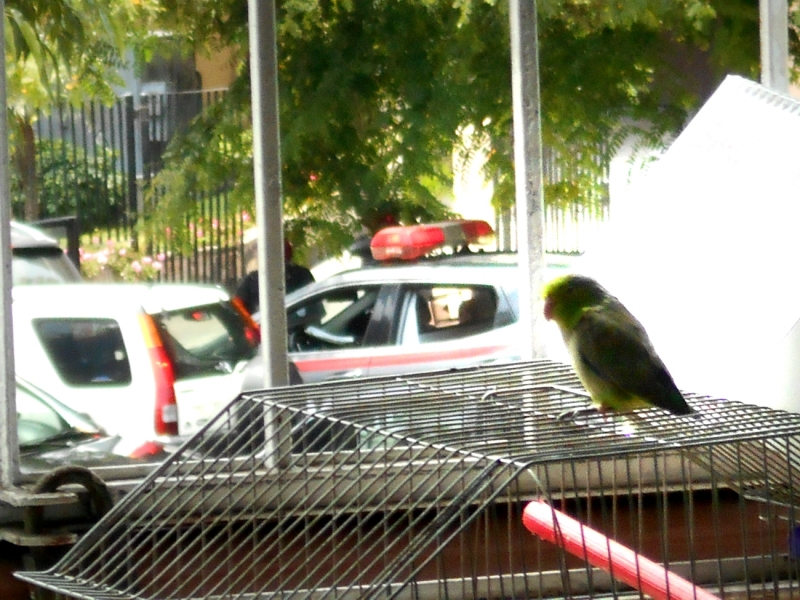How can philosophy change our life? How strong are the influences of our social habits and personal psychological tendencies and of concrete external limitations and threats?
I sit in our apartment at the window and watch our parrot Pericles. Sometimes like today he stands outside his cage and watches the world outside the open window. If he would be a mainstream parrot he would fly outside the window to some tree and gather other parrots who live nearby. This is what we imagine birds would want to do. But he does not do so. Instead he prefers to stay in his little house inside his cage.
Not all members of the same species act in a similar way. When we humans act differently from mainstream humans usually we can justify this difference with words. Discourse permits us to share a whole world vision with others, explaining or justifying why we decide not to leave our cage or why we decide to leave it. The parrot does not need words or cannot use words to explain his decisions.
Is it possible that decision making actually is previous and independent to the elaboration of arguments to defend these decisions?
How strong are our decisions influenced by our social habits and personal psychological tendencies and concrete external limitations and threats? And how strong is our world view influenced by our social habits and personal psychological tendencies and concrete external limitations and threats? And how can philosophy change our lives without previously changing our social habits and personal psychological tendencies and concrete external limitations and threats?
This last dilemma is somehow being approached by most philosophical practices that work on introspection and awareness of our inner world.
Also the Socratic maieutic seems to be based on this fact, since it tries to make us “remember” knowledge that we are not aware of. On the one hand, we know the assumptions of our inner world, even though we are not explicitly aware of them all the time. On the other, we know what is going on in the outside world too, even though we might deny or change facts moved by assumptions of our inner world.
At the beginning of the dialogue Theaetetus, Plato, lets a slave kid read the discussions that Socrates had about knowledge (Theaetetus), religion (Euthyphro), dialectic argumentation (Sophist) and politics (Statesman). The reading of these 4 dialogues happens in Megara, a city known for offering shelter to liberated slaves from Athens and Sparta (*). This suggests that Socrates meant to say that inner awareness cannot happen independently of dealing in practice with real external threats.
Can this explain why parrot Pericles does not want to fly out of the window?
—————————————————————————————————————————————————-
¿Cómo puede la filosofía cambiar nuestra vida? ¡Qué tan fuerte es la influencia de nuestras costumbres sociales, la presión social, nuestras tendencias psicológicas personales y las limitaciones y amenazas concretas externas?
Sentada en la ventana de nuestro apartamento veo a mi perico Pericles. A veces, como hoy día está parado fuera de su jaula y mira hacia afuera por la ventana abierta. Si fuera un perico común y corriente saldría volando por la ventana hacia algún árbol para juntarse con otros pericos que viven por allí. Eso es lo que nos imaginamos que haría cualquier ave. Pero Pericles no. Él prefiere quedarse en su casita dentro de su jaula – con la puerta abierta.
No todos los miembros de la misma especie actúan igual. Cuando los seres humanos no actuamos como la mayoría solemos justificar por qué no, a través del discurso hablado. El discurso hablado permite que compartamos toda una visión del mundo con los demás, explicando o justificando por qué no abandonamos nuestra jaula o por qué sí decidimos abandonarla. El perico no necesita de palabras o, en todo caso, no puede usar palabras para explicar su decisión.
¿Es posible que cuando tomamos decisiones, las tomamos antes e independientmente de los argumentos que podamos esgrimir luego para defender estas decisiones?
¿Hasta qué punto nuestras deciiones están influenciadas por nuestros hábitos sociales y nuestras tendenciaas psicológicas personales y las limitaciones y amenazas concretas externas?
La mayoría de las prácticas filosóficas que trabajan con introspección y reflexión sobre la vida interior ha tratado este tema de alguna manera.
También la mayéutica socrática parece basarse en este hecho, y en ese sentido trata de hacernos «recordar» el conocimiento del que no somos concientes.
Por una parte conocemos los presupuestos de nuestra vida interior, aunque no estemos siempre plenamente conscientes de ellos. Por otra parte, sabemos también lo que pasa en el mundo exterior, aunque a veces tratemos de negar los hechos o tergiversarlos debido a los presupuestos de nuestra vida interior.
Al interior del diálogo Teeteto, Platón deja que un niño esclavo lea las discusiones que Sócrates tuvo sobre el conocimiento (El Teeteto), la religión (El Eutifrón), la argumentación dialéctica (El Sofista) y la política (El Político). La lectura de estos 4 diálogos sucede en Megara, una ciudad conocida en la época por acoger a esclavos liberados o fugados de Atenas y Esparta (*). Esto sugiere que Sócrates quiso indicar que el conocimiento de uno mismo no puede darse independientemente de confrontar también en la práctica a las amenazas externas concretas.
¿Esto puede explicar por qué el perico Pericles no quiere salir volando por la ventana?
* VÖLKL, Karl, “Das Megarische Psephisma” en Rheinisches Museum der Philologie, Band 94 (1951), “Es schloß, so viel ist sicher, die Megarer von allen Häfen des attischen Reiches und vorn attischen Markte aus S), und zwar sah sich Athen zu solchem Vorgehen veranlaßt, weil die Megarer heiliges eleusinisches Land, dann Teile des noch nicht abgegrenzten Grenzgebietes bebaut und entlaufenen attischen Sklaven Zuflucht gewährt hatten (Thucydides. 1130,2; schol. Aristoph. Ach. 532. Frd. 605; Plut. Per. 30.2.)”
FORSDYKE, Sara, “Revelry and Riot in Archaic Megara: Democratic Disorder or Ritual Reversal?” in The Journal of Hellenic Studies, Vol. 125 (2005), pp. 73-92
